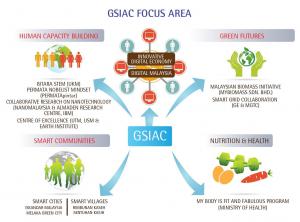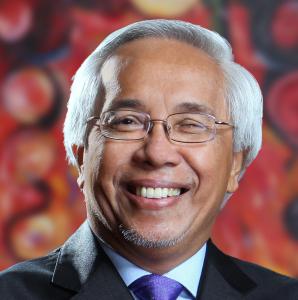Malaysia passes per capita GDP milestone en route to developed country status
International 'Kitchen Cabinet' of sustainable development advisors assesses progress at 5th annual meeting in New York
World Bank data shows that Malaysian GDP per capita -$10,830 in 2014 -has exceeded for the first time the average of all nations worldwide, $10,804. By comparison, in 2010 national per capita GDP was US $8,752, some 8% below the then-world average of US $9,513.
The achievement was noted in a review of Malaysia's unique Global Science and Innovation Advisory Council (GSIAC, gsiac.org), which conducts its 5th annual meeting in Manhattan Sept. 28.
GSIAC, Malaysia's "kitchen cabinet" of national and international sustainable development advisors, is mandated with helping the country achieve $15,000 per capita GDP-the threshold for developed country status -by 2020.
Chaired by Prime Minister Dato' Sri Mohd Najib Tun Abdul Razak, GSIAC is a body of distinguished national and international leaders in economics, business, science and technology. The Council is run jointly by the Malaysian Industry-Government Group for High Technology (MIGHT) and the New York Academy of Sciences (NYAS).
"With the benefit of GSIAC's valuable insights and advice, Malaysia is firmly on the path to developed country status," says Tan Sri Zakri Abdul Hamid, Science Advisor to the Prime Minister, Joint Chairman of MIGHT, and a member of the UN Secretary-General's Scientific Advisory Board.
"There is much to do, however, to reach our $15,000 goal sustainably. From 2015 to 2020 inclusive, Malaysia's per capita GDP needs to increase by $695 per year on average."
He notes that such an increase is well within the projections of the 11th Malaysia Plan, released in May, which foresees private consumption and investment driving growth in gross national income per capita of 7.9% per annum.
Prof. Zakri emphasized that science, technology and innovation, pursued through national Science into Action (S2A) initiatives, are integral to the success of 11th Malaysia Plan, which includes six economic objectives: unlocking national potential and productivity, raising the bottom 40% of households towards middle-class positions, enabling industry-led technical and vocational education and training, fostering green growth and competitive cities, and translating innovation into wealth.
The assessment of GSIAC's first five years of work was conducted by independent reviewers Prof. Mohamed Hassan, Chair of the UN University Council and co-chair of IAP, the Global Network of Science Academies, and Kris Gopalakrishnan, co-founder of Infosys, the world's leading, technology-focused strategic consulting firm, headquartered in India.
"Over the past five years, GSIAC can proudly boast of 10 or so collaborations in various areas that led to the birth of several programs / initiatives," the assessment says.
"Some programs / initiatives require more time to complete construction or implementation to achieve large-scale results. However, positive results are noted despite significant challenges in implementation."
The report calls for the nation-wide scale up of pilot projects My Body Fit and Fabulous, and Bitera STEM, with implementation monitored by Malaysia's National Science Council.
Among other proposals, the reviewers called for establishment of at least one interactive science center in each state to promote "hands-on" science education and literacy.
They highlighted as well the opportunity to introduce to religious educational institutions inquiry-based learning and problem-solving skills, "which could be a unique contribution of Malaysia to the world -transforming religious learning institutions."
In addition to offering suggestions on specific programs, the reviewers make several overarching recommendations:
* Close alignment of GSIAC efforts with the 11th Malaysia Plan and the post-2015 global Sustainable Development Goals (SDGs)
* The appointment of young innovators and additional women to the Council
* That the Council underscore the importance of science, technology and innovation to economic growth, job creation and prosperity
* The encouragement of more South-South cooperation
International evaluations of Malaysian innovation
This year's GSIAC meeting had the benefit of insights from the Global Innovation Index (GII) report, newly-published by Cornell University, INSEAD, and the World Intellectual Property Organization (WIPO).
In this year's GII, Malaysia ranks 32nd in the world overall, up a notch from 33rd the year before, and Malaysia is the top-ranked middle-income country.
The report credits "political stability, inflows of foreign direct investment, and export-oriented industrialization"for Malaysia's successful transformation into "an upper middle-income country."
OECD's review
Another review of Malaysian innovation policy, prepared by the OECD, foresees "immense opportunities to be seized" thanks in part to the country's proximity to the world's largest, most populous and dynamic emerging economies, China and India. This environment offers opportunities to explore and develop several economic niches "capable of generating prosperity in a sustainable manner," according to advance knowledge of the report.
Comments
Prof. Tan Sri Zakri Abdul Hamid, Science Advisor to the Prime Minister of Malaysia; Joint GSIAC Secretary
"Malaysia is helping to foster the internationalization of science to enlarge our domestic capacity through global partnership - a point very clearly underlined in our national Science, Technology and Innovation policy. International linkages in the form of stakeholder networks, partnerships and collaborations help to find global remedies to challenges faced at home and to integrate technologies across all sectors of the economy."
Datuk Dr. Yusoff Sulaiman, Joint Secretariat, GSIAC; President and CEO, MIGHT
"I am pleased that the assessment highlighted a number of successful collaborations in human capacity building, STEM (science, technology, engineering and math) education, green futures, information and communications technologies, smart communities and health. Many of these programs are considered 'game changers' drawing the participation of both international and Malaysian organisations."
###
Malaysian Industry-Government Group for High Technology
MIGHT is a not-for-profit company limited by guarantee under the purview of the Prime Minister of Malaysia. MIGHT is an organization built on the strength of public-private partnership with more than 100 members, both local and international, from industry, government and academia. As an organization MIGHT is dedicated to providing a platform for industry-government consensus building in the drive to advance high technology competency in Malaysia.
Malaysia 11th Plan
In full: http://bit.ly/1NYrcKr
Brochure: http://bit.ly/1R5wBxA
Executive Summary: http://bit.ly/1QCPjf6
Terry Collins
TCA
4168788712
email us here
Legal Disclaimer:
EIN Presswire provides this news content "as is" without warranty of any kind. We do not accept any responsibility or liability for the accuracy, content, images, videos, licenses, completeness, legality, or reliability of the information contained in this article. If you have any complaints or copyright issues related to this article, kindly contact the author above.



